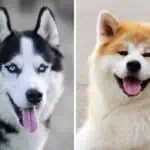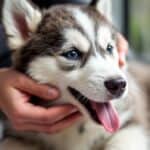Deciding between a Siberian Husky and a Golden Retriever is like choosing between a thrilling adventure and a heartwarming story. Both breeds are incredibly popular and for good reasons. They’re not just dogs; they’re family members with unique personalities and needs.
While Huskies are known for their boundless energy and striking looks, Golden Retrievers win hearts with their loyalty and golden coats. But don’t let their appearances fool you; there’s more to these breeds than meets the eye.
Let’s dive into the world of Huskies and Golden Retrievers to uncover what makes each of them so special.
Article Content:
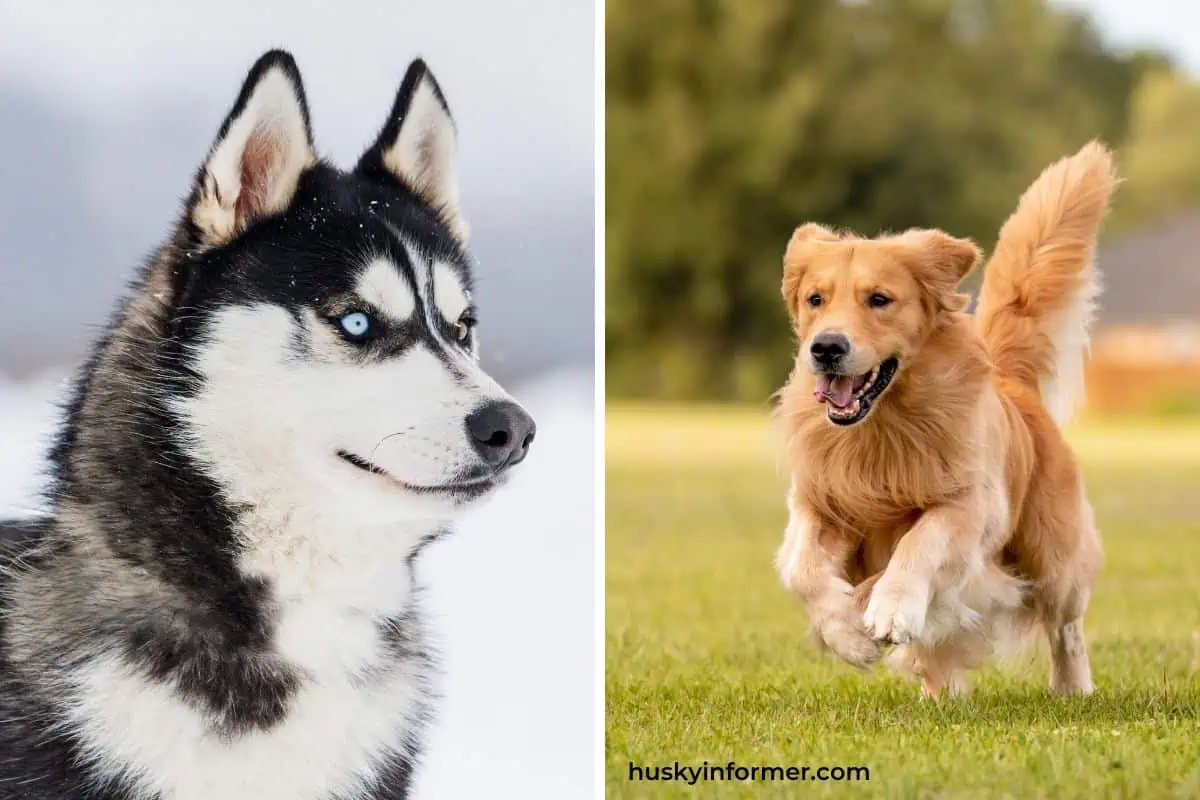
Appearance
When choosing between a Siberian Husky and a Golden Retriever, appearance is often a significant consideration. Both breeds boast distinctive looks that capture attention, but their physical traits cater to different preferences. Let’s delve into what sets each breed apart in terms of appearance.
Husky
The striking looks of the Siberian Husky often draw immediate adoration from dog enthusiasts. Huskies are medium-sized dogs, typically standing between 22 and 24 inches tall. Their build is leaner compared to Golden Retrievers, with weights ranging from 35 to 65 pounds.
One of the most remarkable features of Huskies is their thick, double coats that not only provide insulation against cold weather but also come in a stunning variety of colors. Black, Gray, Red, White, Sable, and Agouti hues are found in their coats, offering potential owners a wide array of choices.
Additionally, their iconic blue or multi-colored eyes add to their enchanting presence, making them stand out in the canine world. Despite their beauty, Huskies require regular grooming to manage their shedding, which is above average.
Golden Retriever
The Golden Retriever, with its iconic golden coat, exudes a charm that’s hard to resist. These dogs also fall into the medium size category, standing about 22 to 24 inches tall, but they tend to be slightly heavier than Huskies, weighing between 55 and 75 pounds.
What sets Golden Retrievers apart is their fluffy, shiny coats that come in various shades of gold. Their fur is not just a delight to touch but also adds to their overall adorable and friendly look.
Golden Retrievers’ warm, expressive eyes mirror their famous gentle disposition, enhancing their appeal. Like Huskies, Golden Retrievers have an average grooming need, but their shedding level is moderately high, which means they’ll also need regular brushing to keep their coats looking best.
Both breeds have their unique aesthetic appeal, and the choice between a Husky’s diverse and striking appearance versus a Golden Retriever’s classic, friendly look often comes down to personal preference.
Temperament
When considering adding a furry friend to the family, it’s crucial to understand their temperament. Huskies and Golden Retrievers have distinct personalities that cater to different lifestyles and preferences. Let’s dive into what makes each breed unique in terms of temperament.
Husky
Siberian Huskies are known for their outgoing and independent nature. They are incredibly loyal to their families but don’t always show their affection in the expected cuddly ways. Instead, they express their love through playful gestures and a desire to be involved in family activities. Huskies are packed with energy and thrive on regular, vigorous exercise.
This breed’s independent streak means they can be somewhat stubborn, which poses a challenge in training sessions. Yet, their intelligence can’t be underestimated. With the right approach, Huskies can learn and follow commands, though it might take more patience and creativity than with other breeds.
Socialization from a young age is crucial for Huskies, not only to curb potential destructiveness due to boredom but also to ensure they’re well-behaved around other pets and children.
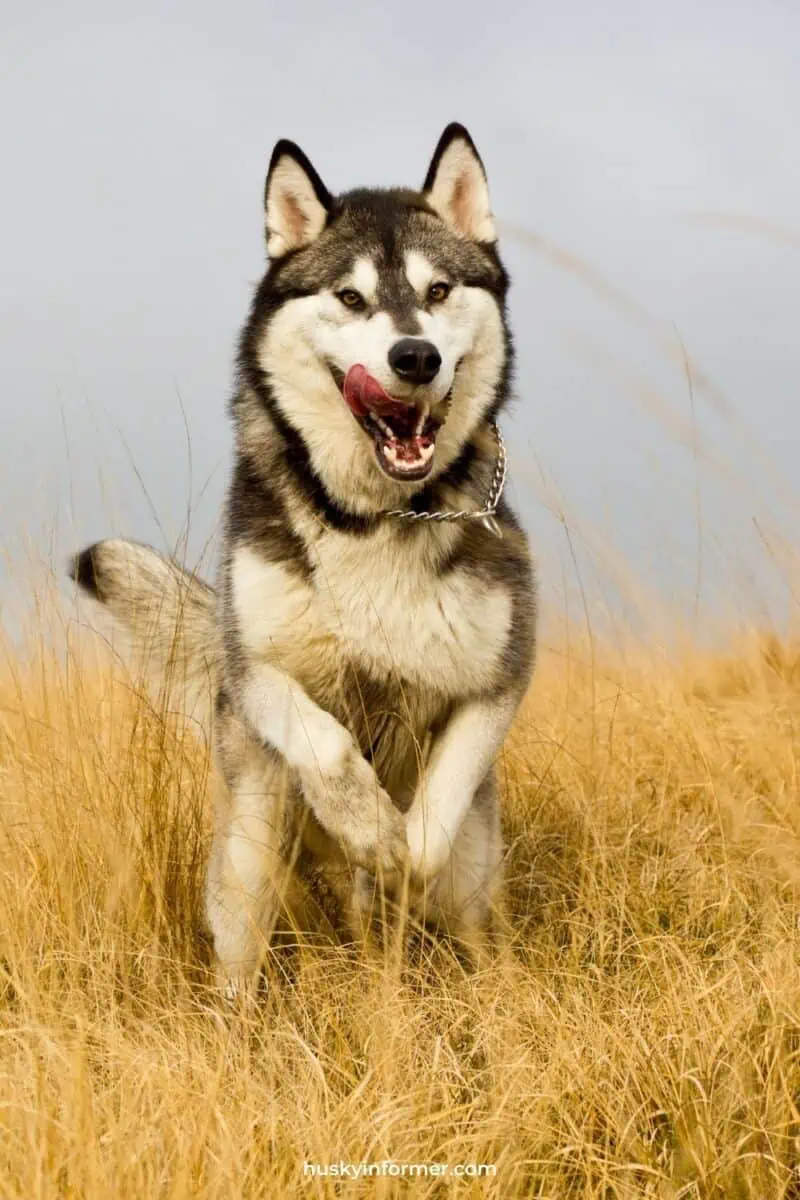
Golden Retriever
Golden Retrievers, on the other hand, are the epitome of friendliness and reliability. Their kind eyes and constantly wagging tails highlight a breed that’s full of love and eager to please. This makes them not only fantastic family pets but also excellent for roles such as guide dogs or therapy animals.
Their high intelligence and eagerness to please make them highly trainable, responding well to both basic commands and more complex tasks. Goldens have an undeniable joy for life, whether they’re on an adventurous hike or simply lounging by their owners’ feet. They are particularly known for their gentleness with children and good nature with other pets, making them a harmonious addition to virtually any home.
Their sociable nature means they don’t like being left alone for long periods, thriving in an environment where they can interact and be part of the family dynamics.
Exercise and Activity Levels
When deciding between a Siberian Husky and a Golden Retriever, understanding their exercise and activity needs is crucial for a harmonious home life. Let’s delve into the demands of each breed to help you determine which might be the better fit for your lifestyle.
Husky
Siberian Huskies are high-energy dogs that thrive on physical activity. They were originally bred to pull sleds over long distances, and this heritage informs their need for regular, vigorous exercise. Huskies require a lot of exercise to stay happy and healthy.
Without sufficient activity, they can become bored and destructive, often turning to chewing furniture or digging as outlets for their pent-up energy. I’ve found that they need at least an hour of vigorous exercise daily, which can include running, hiking, or even agility training. In addition to physical exercise, mental stimulation is equally important for Huskies.
Activities like puzzle toys or hide-and-seek with treats can keep their mind engaged and prevent behavioral issues.
Golden Retriever
Golden Retrievers are also high-energy dogs but their exercise needs are slightly different from Huskies. They need a lot of exercises too, but their approach to physical activity tends to be more laid-back. A long walk or a game of fetch can satisfy their daily requirements.
Goldens are highly trainable and eager to please, making them excellent candidates for obedience or agility activities that engage both their body and mind. Swimming is another great exercise for Golden Retrievers due to their love of water and natural retrieving instincts.
Like Huskies, they benefit from mental stimulation and enjoy interactive games that challenge their intellect.
Both breeds are remarkable companions for active individuals or families who love spending time outdoors. Whether it’s a Husky’s need for extended physical activity or a Golden Retriever’s preference for interactive play, ensuring these dogs get enough exercise is critical in keeping them well-behaved and content. So, if you’re up for the challenge and ready to incorporate these activities into your daily routine, either breed could be a fantastic addition to your family.
Grooming
When deciding between a Siberian Husky and a Golden Retriever, understanding their grooming needs is crucial. While both breeds bring joy and energy to a home, they have distinct grooming requirements that stem from their unique coat types and shedding patterns. Let’s dive into what grooming entails for each of these beloved dogs.
Husky
The Siberian Husky’s coat is a marvel of nature, designed to protect them from harsh climates. It’s double-layered, with a dense undercoat and a longer topcoat that repels water and insulates against cold. While huskies are clean dogs with little dog odor, their grooming requirements cannot be underestimated.
I’ve found that regular brushing at least once a week is essential to remove loose fur and distribute skin oils well. However, during their bi-annual shedding seasons, daily brushing becomes a necessity.
This helps manage the massive amounts of fur they shed and keeps their coat healthy. Interestingly, despite their thick coats, huskies do not need frequent baths.
Bathing with dog-safe shampoos every 3-4 weeks or only when they’re visibly dirty suffices, preventing essential oils from being stripped from their coat.
Golden Retriever
Golden Retrievers are adorned with a dense, water-repellant outer coat and a thick undercoat. This breed is known for its moderate to heavy shedding year-round. To keep their shiny, silky coat free of tangles and mats, weekly brushing is a must. However, during the spring and fall shedding seasons, I recommend increasing brushing to a few times a week.
In terms of bathing, Golden Retrievers can benefit from a bath every 1-2 months, although this can vary based on their activity level and how dirty they tend to get. It’s also crucial to pay attention to their ears, as their floppy nature can be prone to infections without proper care.
In my experience, both breeds require a commitment to regular grooming, which not only keeps them looking their best but also provides an opportunity for bonding. Despite the effort involved, the joy and companionship these dogs offer make every grooming session worth it.
Training and Intelligence
When it comes to comparing the Siberian Husky and the Golden Retriever, their approaches to training and levels of intelligence offer fascinating insights into their distinct personalities and innate abilities. Both breeds are undoubtedly intelligent, yet they respond to training in different manners, shaped by their unique breed characteristics and historical backgrounds.
Husky
I’ve always been captivated by the Siberian Husky’s intelligence, but it’s their independent nature that truly stands out. This independence, while it showcases their intelligence, often translates into a more challenging training experience.
Huskies were bred to make decisions on their own in the harsh environments of Siberia. Consistency and patience are key with Huskies. They require engaging and varied training sessions to keep their attention. Keeping training sessions short and exciting is essential in maintaining their interest.
Their stubborn streak can be a hurdle, but with the right approach, training a Husky can be an incredibly rewarding experience. It’s important to start socialization and obedience training early, always emphasizing positive reinforcement.
Golden Retriever
On the flip side, the Golden Retriever’s trainability is almost legendary. Their eagerness to please and innate intelligence make them a dream to train. I’ve found that positive reinforcement techniques work wonders with Golden Retrievers.
They respond well to rewards, whether it’s praise, play, or treats. This breed’s loyalty and devotion are unmatched, making them not only excellent family pets but also superb assistance dogs. Agility training and learning tricks can be both fun and mentally stimulating for them.
Just like with the Husky, early socialization and obedience training lay a solid foundation for a well-behaved Golden. Despite their natural inclination towards being ‘teacher’s pets,’ it doesn’t mean they don’t require effort and dedication in training. It’s a process that greatly benefits from persistence and love.
In comparing the training and intelligence of the Siberian Husky and the Golden Retriever, one can see that while they may learn differently, both breeds possess deep intelligence and potential for being wonderful companions. Each comes with its own set of challenges and rewards in training. Moreover, understanding these differences is key to fostering a harmonious and fulfilling relationship with these amazing dogs.
Health Concerns
Diving into the health aspects of these beloved breeds, it’s crucial to recognize that while both the Siberian Husky and Golden Retriever generally boast strong health profiles, they each face their own set of potential concerns. Understanding these can help prospective and current dog owners provide the best care possible.
Husky
I’ve always admired the Siberian Husky for its striking appearance and robust health. Thanks to a long history of endurance and versatility, Huskies are among the healthiest dog breeds. They’re known to enjoy a lifespan of 12 to 14 years, which is impressive for their size. Despite their hearty nature, Huskies aren’t immune to health issues. They can be prone to conditions like hip dysplasia, progressive retinal atrophy, and cataracts. Hypothyroidism is another condition to be on the lookout for in Huskies.
| Condition | Siberian Husky |
|---|---|
| Hip Dysplasia | Common |
| Progressive Retinal Atrophy | Possible |
| Cataracts | Possible |
| Hypothyroidism | Less Common |
Golden Retriever
The Golden Retriever, with its sunny disposition and eager-to-please attitude, still requires careful attention to its health. Typically, Golden Retrievers live 10 to 12 years. They’re susceptible to a broader range of health issues compared to Huskies. Notable concerns include hip dysplasia as well, but they also face risks of elbow dysplasia, cardiac issues, and a neurological condition known as neuronal ceroid lipofuscinosis. Goldens are also more prone to various types of cancer, which can impact their lifespan and quality of life.
| Condition | Golden Retriever |
|---|---|
| Hip Dysplasia | Common |
| Elbow Dysplasia | Common |
| Cardiac Concerns | Possible |
| Neuronal Ceroid Lipofuscinosis | Possible |
| Cancer | More Common |
In both breeds, but perhaps more so in the Golden Retriever, potential genetic predispositions to these health issues underline the importance of regular veterinary check-ups and opting for preventative care whenever possible. While these conditions might sound concerning, awareness and early intervention can make a significant difference in managing the health and happiness of our furry friends.
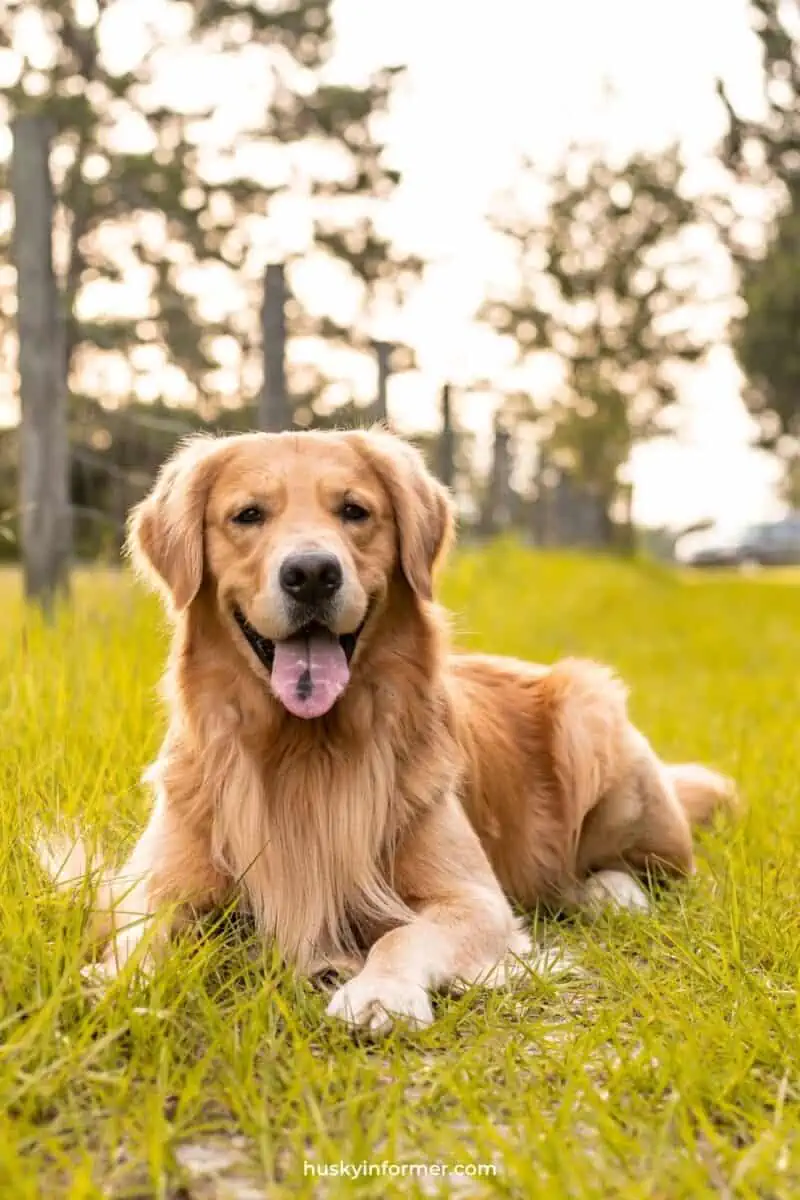
Who Should Get a Husky?
When considering who should get a Husky, it’s important to understand the unique traits and requirements of this majestic breed. I’ve always been fascinated by Huskies, not just for their stunning appearance, but also for their energetic, resilient nature. If you’re the kind of person who loves outdoor activities and is looking for a companion for adventures, a Husky might just be your perfect match. These dogs don’t just enjoy being active, they require it. Regular, vigorous exercise is non-negotiable for them.
Huskies come with a double-layered coat that offers protection in harsh weather. This means if you’re living in a colder climate, a Husky will thrive. However, it also means you should be prepared for regular grooming sessions. Their shedding levels are above average, and their coats require frequent brushing to keep them clean and free of mats. This aspect of their care is something to seriously consider.
Another important factor is the living environment. Huskies are known for their love of space and tend to do best in homes where they have room to roam and explore. They’re not the best fit for small apartments or homes without yards. Also, their high intelligence and independent streak can make training a challenge, requiring patience and consistency. So, if you’re someone who enjoys training and mental engagement with your dog, a Husky can make it rewarding.
Their sociability extends to humans and animals alike, although they have been noted to do best as the only pet. This breed’s compatibility with other animals is something to think about, especially if you have other pets at home. Huskies also have a distinct personality trait of being somewhat reserved with strangers, yet they remain loyal and loving with their family.
Finally, perhaps the most distinctive aspect of deciding if a Husky is right for you concerns your lifestyle and energy levels. These dogs are not content with just a walk around the block or occasional playtime. They thrive on engagement, challenges, and adventure. So, if your lifestyle can mesh with the needs of a Husky, bringing one into your home could be an enormously fulfilling decision.
Who Should Get a Golden Retriever?
Deciding on whether a Golden Retriever is the right fit for you and your lifestyle requires a deep dive into what makes this breed so special. Known for their loyalty, friendly nature, and golden coats, these dogs are not just pets; they become an integral part of the family. I’ve always believed that understanding a dog’s needs is key to a happy coexistence, and Golden Retrievers are no exception.
Individuals or families looking for a dog that exudes warmth and friendliness will find a perfect companion in a Golden Retriever. Their affable nature makes them excellent around children and other pets. They’re not just sociable; these dogs thrive on interaction, whether it’s a game of fetch or a family outing. Their need for moderate exercise aligns well with active families or individuals who enjoy daily walks and outdoor activities.
Training a Golden Retriever is, in my experience, a rewarding journey thanks to their keen intelligence and eagerness to please. They respond well to positive reinforcement and consistent training sessions, making them suitable for first-time dog owners. Their adaptability means they’re as comfortable in a spacious suburban home as they are in a more confined city dwelling, provided they get their needed exercise.
Golden Retrievers have an average grooming requirement due to their dense coat, which requires regular brushing to manage shedding. They also have a moderate shedding level, making them a manageable breed for those who don’t mind a bit of hair around the house.
The ideal candidate for a Golden Retriever is someone who values companionship and is prepared to provide the mental and physical stimulation this breed craves. Their friendly demeanor and unwavering loyalty make them the perfect addition for those looking for a deeply connected pet relationship.

